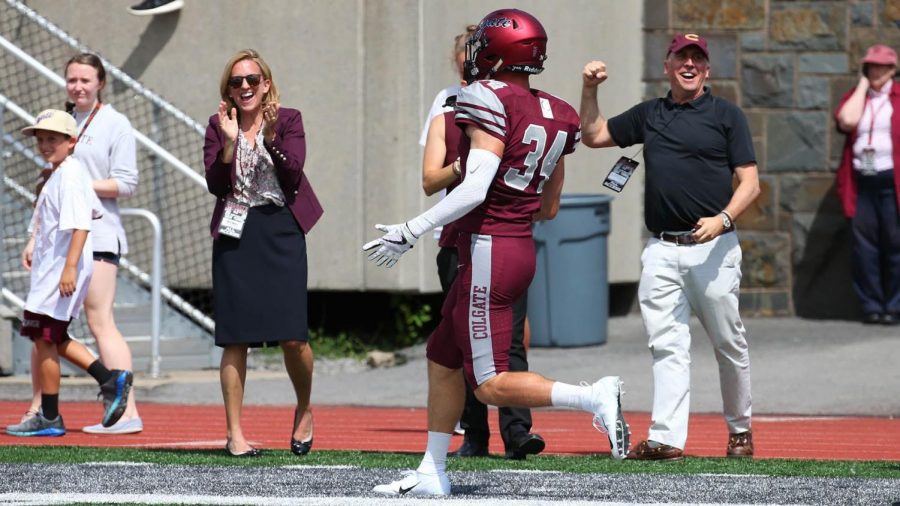Athletic Director Nicki Moore’s Commitment to the Student-Athlete
This article is Part Two of a three-part series written after an interview with Athletic Director Nicki Moore on Wednesday, Jan. 29. Part One discussed Moore’s background at the University of Oklahoma and University of North Carolina and her early impact on Colgate’s Athletic Department and student-athletes. Part Three will dive into Moore’s relationship with Colgate’s coaches and her long-term vision for the Athletic Department.
Coaches carry a few common, innate traits: They lead by example, working harder to prepare for the battle ahead than the athletes in training grounds; they are experienced, having seen and learned from the highs or lows of previous days and making the proper adjustments, and they are compassionate, demonstrating a willingness to listen to the concerns of the team.
At Colgate, Athletic Director Nicki Moore has been quick to demonstrate the traits above, bringing lessons from graduate school and her time with the University of Oklahoma and University of North Carolina.
Back in 2004, Moore found her schedule completely booked with student-athletes for one-on-one counseling or therapy sessions. Because of the backlog, she had to work to find a solution that would serve the interests of student-athletes seeking help.
“It became evident really quickly that it was not going to be sustainable and not serve the needs of the student-athletes in the way that I wanted to. So, that’s when I started reaching out to the counseling psychology program,” Moore said.
In response to the backlog, Moore and her colleagues launched a fellow program—akin to how graduate-level psychology programs function—with graduate students working and gaining experience.
Admittedly, she had a great deal of career ambiguity early on and stayed in school to further her education. Moore picked up graduate assistantship experience in the University of Missouri athletic department while earning her masters and doctorate. The fellow tactic—which she benefitted from early in her career—is a strategy she brought to Colgate which has continued to provide benefits to the department and fellows alike.
Moore’s background as a competitor and counselor allows her to relate to student-athletes; she is passionate about supporting all of Colgate’s teams, regardless of their public notoriety or level of recognition on campus.
“Since Nicki has come to Colgate, I feel like the [women’s tennis] team has gained a major supporter. She has come to some of our home matches in Syracuse, which has been done by very few athletic staff in my time at Colgate, and reassured us that, although we are one of the smaller teams at Colgate, we are still on her radar and she is rooting for us to succeed,” senior women’s tennis captain Jordan Williams said.
She can also relate to academic priorities, something which she has noticed—and is particularly proud of—as a noteworthy feature among Colgate’s student-athletes. A side benefit, Moore believes, is a more seamless and genuine integration of Colgate’s athlete and non-student-athlete populations.
“The divide is less of a thing here than any other campus I have been on. It’s hard to stay anonymous and super-segregated. I think it’s harder with a campus [of] our size,” Moore said. “There is more genuine integration because of that [academic] commitment. It’s one of the main reasons our student-athletes come here.”
Still, Moore would like to see more support from the non-student-athlete population. Though attendance is up at many varsity team events, particularly the basketball teams and volleyball, there is not the SEC or ACC level of support at games to which Moore was accustomed.
And despite the fact that there are under 3,000 undergraduate students, it is uncommon to have this level of competition so frequently come to such a small town. Like the NY state winter landscape, Colgate’s varsity competition can go under appreciated by the student body and lie hidden in the hills.
“I want our non-student-athletes to have that experience of fist bumping or chest bumping a stranger and having exciting, engaging Colgate athletics events be a part of their memory book of Colgate because it is one of the really unique things that we have. You talk to other peers at liberal arts institutions and they aren’t going to have that,” Moore said.
In the meantime, Moore is making sure Colgate’s student-athletes are satisfied with their programs. And while she admits some are significantly underfunded, it has not stopped her from finding six new head coaches in the last 18 months.
“For her previous experience to be at such large and athletically well known institutions makes me very hopeful and excited to see how Colgate Athletics is going to evolve into something I am sure will be no less than excellent. Her focus seems to be on getting to know every athlete and making sure they have any type of support they need. She is such an accomplished woman and an incredible addition to our community,” Williams said.
Moore has taken advantage of the resources available, including the feedback of the student-athletes. As a part of the coach hiring process, Moore consulted pairs from each class year from the teams that needed a new head coach to serve as consultants in an advisory group.
The groups would discuss the general coaching style they prefer, the unique features that make their programs special and, more generally, how the department can offer support.
“They are incredible. I’m impressed by our student-athletes everyday. Of course, they are students and sometimes they really screw up, but that is part of the process, too. Even the ones that screw up are doing really interesting and good things with their lives. It’s a fun process,” Moore said.
Moore enjoys her work because she has the privilege of supporting students with competitive drive. She fills the role of coach—even among coaches, at times.
While she started at the front end of mental health initiatives in college athletics, she is ready to lead Colgate Athletics into its next phase.








